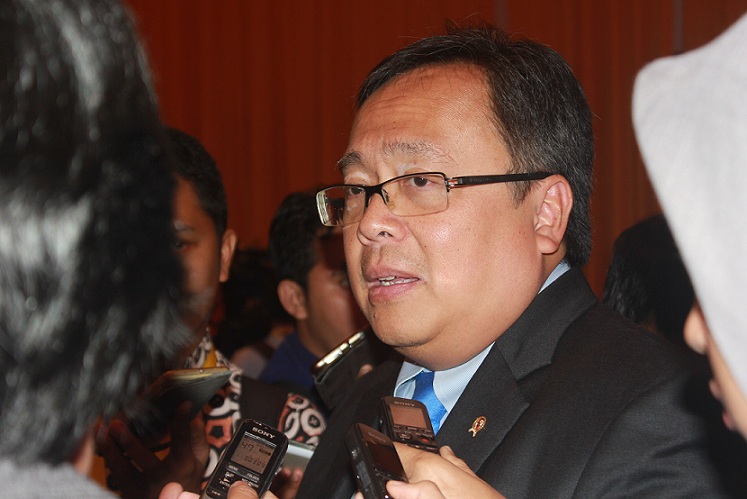Indonesia launches 10-year Islamic finance masterplan
Photo: National Development Planning Agency (Bappenas) minister Bambang Brodjonegoro speaking to reporters following the launch of Indonesia's 10-year Islamic Finance Masterplan at the 12th World Islamic Economic Forum (WIEF) on August 2, 2016 in Jakarta, Indonesia
JAKARTA – The Indonesian government today launched its 10-year Islamic finance masterplan to accelerate growth of the country’s Shariah-compliant financial sector.
“It is time the government of Indonesia, together with the financial regulators, embark on expanding our Shariah financial system into a broader dimension, market and playing field,” National Development Planning Agency (Bappenas) minister Bambang Brodjonegoro told reporters on the sidelines of the 12th World Islamic Economic Forum (WIEF) in Jakarta.
Indonesia’s Islamic banks hold roughly 5 percent of total banking assets in the country, compared with more than 20 percent in Malaysia.
The country’s authorities want Shariah-compliant banks to hold at least 15 percent of the market by 2023.
The masterplan consists of action plans and interventions covering important aspects of the Islamic finance industry such as capital adequacy, human resources development, governance, consumer protection, and financial safety nets.
NATIONAL COMMITTEE
A national committee will be formed to drive the improvement and expansion of the banking industry and other sectors including insurance, capital market, asset management, microfinance, and social and religious funds.
The high-level committee will be chaired by President Joko Widodo with Vice President Jusuf Kalla serving as vice chairperson.
The rest of the committee will consist of the Minister for National Development Planning/Head of National Development Planning Agency, Minister of Finance, Coordinating Minister for Economic Affairs, Minister of Religious Affair, Minister of State-Owned Enterprises, Minister of Cooperatives and SMEs, Chief Commissioner of the Indonesian Deposit Insurance Corporation, and the Head of Indonesia Ulema Council.
The committee will work to synergize Islamic finance development efforts covered by all stakeholders in government, regulatory authorities and industry bodies.
NATIONAL DEVELOPMENT
Indonesia will also build its Islamic finance ecosystem to better serve the demands of the country’s national development.
Brodjonegoro said the country wants to establish retakaful companies, improve the quality of Islamic economic and financial education in tertiary institutions, and enlarge the size of its sukuk market.
The government will also continue to work with the Islamic Development Bank (IDB) and the Turkish and Saudi governments on the establishment of an Islamic infrastructure bank, which will provide funds for infrastructure development and meet the liquidity needs of Islamic countries.
(Reporting by Linda Silaen, Writing by Emmy Abdul Alim)
© SalaamGateway.com 2016
